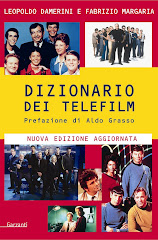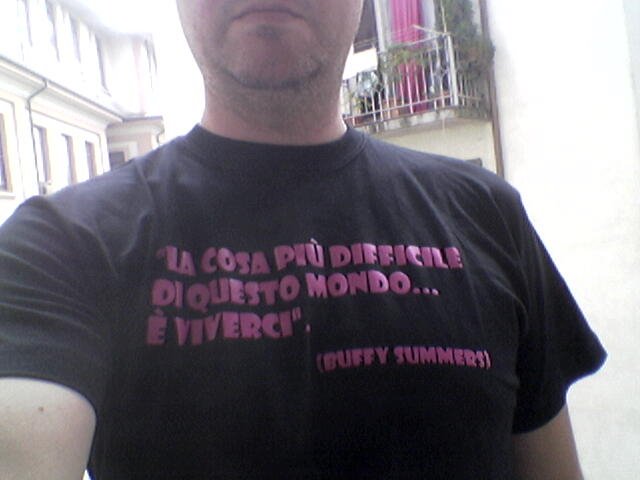NEWS - Basta! La "Golden age" è finita! Le serie tv non sono più superiori al cinema: "Slate" rilancia la sfida tra piccolo e grande schermo
Articolo di
David Haglund per "
Slate"
"Who was the first person to say that TV is better than the movies? It’s probably impossible to say, but the argument in its contemporary form may date to October 1995, when Bruce Fretts—with “additional reporting” from 10 (!) of his colleagues at
Entertainment Weekly—offered, over several pages, “10 simple reasons why the small screen is superior” to the big one. Even if you didn’t read it at the time, the piece will feel strikingly familiar: Replace
NYPD Blue and
The X-Files with
Mad Men and
Breaking Bad
and the argument made by Fretts is more or less identical in its
essentials to the one that over the last six or seven years has appeared
in
Time,
Newsweek, the
New York Times, the
Wall Street Journal,
Vulture,
Vanity Fair,
Entertainment Weekly (again!), and on blogs too numerous to count.
But that bit of early-EW populist rabble-rousing was pre-Sopranos, when the Emmys were still dominated by the networks. The big awards players at the time were NYPD Blue, ER, and Picket Fences. (Pretty good shows, but come on.) Meanwhile, the movies that year brought us Toy Story, Before Sunrise, Heat, Clueless, Safe, 12 Monkeys, The Usual Suspects, To Die For, Dead Man, Kicking and Screaming, Casino, Seven, Welcome to the Dollhouse—not to mention the five movies nominated for Best Picture, a whole bunch of good films made overseas, and some excellent documentaries. Recently, one writer argued that 1995 was the “best year ever for movies.”
Unlike this year, when the Emmy nominations remind us of the high
quality of recent television shows, it was flatly ridiculous to argue
for TV’s superiority in 1995.
It would seem, then, that a subset of cultural critics has wanted to
make the TV-is-better argument for a long time, well before it was even
remotely plausible—and for reasons having little to do with the artistic
merits of the best TV shows and the best movies. But why?
On some level, of course, the whole argument is absurd. People will
tell you that the dozens of hours TV shows devote to their characters
make those characters richer than their cinematic counterparts—but
dramatists have known for literally centuries that you only need one
night to create a character people will never forget. TV boosters note
again and again that, on cable, the writer is king—something I certainly
appreciate as a writer. But why is it better for writers, rather than
directors, to have final say in what is ultimately a visual medium? And
besides, no critic watches enough television and movies to
compare the two media with any thoroughness. (One wonders how many of
the movies from ’95 listed above that Bruce Fretts, the EW writer, had seen. He keeps bringing up Showgirls.)
What’s more, it is becoming harder and harder to keep up: There are so
many cable networks and so many movies getting made every year—and the
old “it never played here” excuse no longer works for the littler
movies, thanks to video-on-demand and DVDs and so on.
And that, it occurs to me, is precisely the point: The TV-is-better
argument is, above all, an attempt to narrow the range of what
sophisticated viewers feel obligated to watch. Yes, such polemics
sometimes serve other purposes. (Shaming Hollywood studios out of making
another board-game-inspired blow-’em-up and turning to taut, Breaking Bad–style
thrillers instead, for instance.) But generally the TV-is-better
argument is a way of saying, “I don’t have to keep up with the movies
anymore, and neither do you.”
That this is what’s really going on was brought home for me while reading Brett Martin’s very enjoyable new book,
Difficult Men: Behind the Scenes of a Creative Revolution, all about TV’s post-
Sopranos
golden age. In the prologue, Martin writes that the prestige cable
drama is “the signature American art form of the first decade of the 21
st
century, the equivalent of what the films of Scorsese, Altman, Coppola,
and others had been to the 1970s or the novels of Updike, Roth, and
Mailer had been to the 1960s.” Put aside, for a second, the overwhelming
maleness of that list (though it’s not entirely incidental). Put aside,
too, the fact that Norman Mailer wrote his best novels before the 1960s
had begun and Roth wrote his well after that decade was over. Focus
instead on this idea that there is, at any one point, a single
“signature American art form.” That’s a ridiculous notion. And Martin
goes a step further later on in the book: “Men alternately setting loose
and struggling to cage their wildest natures has always been the great
American story,” he declares, “the one you find in whatever happens to
be the ascendant medium at the time.”
The great American story? You mean there’s only one?
Critics who claim that TV is better than the movies now would
generally, it seems, prefer that there only be one. And when it comes to
quality, TV remains, for the most part, a great simplifier. Ask nearly
any professional critic—not to mention many amateur ones—for the best TV
shows of the last decade or so, and you will get a very familiar list,
starting with The Sopranos and ending, probably, with Breaking Bad, or maybe, say, Homeland or The Americans. You will almost certainly have heard of every show. You are not likely to encounter the sometimes bewildering variety that a collection of film critics is likely to present you with.
And there are good reasons for that. For one thing, when we talk
about television, we are almost always only talking about American
television. Maybe we’ll include a few British shows, but rarely do we
grapple with foreign-language efforts, the way serious moviegoers have
been doing for decades. And while the source of most cinematic
creativity in the United States has for the last few decades probably
come from independent filmmakers, there is not really any such thing as
independent television. (The medium, for the most part, just doesn’t
work that way.) So while the best movies come from an intimidating
diversity of sources, and present a similarly wide range of aesthetic
approaches and aims, the best TV shows tend to come from three or four
American cable networks and frequently follow a familiar model. (It’s like The Godfather, only in modern-day New Jersey—or in the advertising world, or the New Mexico meth market, or in Hollywood …)
Take
today’s Emmy nominations, which, though there were, as always, a few surprises and snubs, generally rewarded the prestige dramas—
House of Cards,
American Horror Story,
Game of Thrones,
Mad Men,
Breaking Bad,
Homeland—that most people regard as the best stuff on TV. Compare that to
any year’s Oscar nominations, which encompass multiple filmmaking styles and span the studio and indie world and
still rarely scratch the surface of what critics and serious moviegoers consider the best of the year. Or just consider the wild range of movies on view in a critics’ poll of the best 2013 movies so far, from
Before Midnight to
Upstream Color to
Spring Breakers (and that’s just the top three—and we’re still months away fr
om Oscar season).
It may be true that, for much of the year, you can’t find good movies
just by driving to the multiplex, while there’s often something good
waiting on your DVR. And that people aren’t talking enough about the
really good films that get released—sometimes on only a handful of screens—throughout
the calendar year. But the proper solution to this problem, if you’re a
critic, is not to tell people to just watch TV instead. It’s to tell us
which new movies are worth our attention, and where they can be found. It’s to make the conversation about the art that matters the most.
After all, the most consistent refrain from TV-is-better pieces is:
Everyone is talking about that great, culture-dominating TV show, and
nobody talks about the movies anymore. (Bruce Fretts’ “simple reason” no. 5: “
TV is more fun to talk about.”) In
Vanity Fair, James Wolcott—who finds the TV-is-better argument so nice he’s made it twice—says “the new movie that everybody’s talking about is being talked about by a shrinking number of everybodies.” Gavin Polone opens his piece for
Vulture by noting that in one day he heard three random strangers talking about
Breaking Bad. In the
New York Times, A.O. Scott asks, “Will any of the movies surfacing this fall provoke the kind of conversation that television series routinely do, breaking beyond niches into something larger?”
In fact, plenty of recent movies have inspired a great deal of cultural conversation. (Zero Dark Thirty, Django Unchained, and Lincoln
come quickly to mind.) But more importantly, when it comes to the real
artistic merit of what we’re watching, the volume of such conversations
is neither here nor there. You know what people talk about even more
than Breaking Bad? Sports. I can discuss football, baseball,
and basketball with huge numbers of people from all walks of life. But
that doesn’t make the last Red Sox–Yankees tilt a work of art
(especially not lately).
What bothers me most about the TV-is-better line, finally, is that TV could
be better. As this year’s many Emmy nominations for Netflix series
helps to demonstrate, we now watch a lot of “television” and “movies” in
the same way: at home, on big TV screens and little computers. Behind the Candelabra,
which got 15 Emmy nominations, is an HBO presentation in the States—and
a movie overseas, where it is playing on the big screen. The gap
between these two media is closing—and there’s no reason, theoretically
speaking, that the adventurous approaches to visual storytelling that we
see in certain movies couldn’t come to TV, too. We could all start
watching more foreign-language shows—I hear Borgen is great—and
more independently produced Web series, which get better all the time.
We could, in other words, eventually have a television landscape that is
as artistically rich and varied as the movies are right now. And that
would be a true golden age".
 Don't get too excited about certain writers taking their hands off the
property - Alex Kurtzman and Bob Orci are still on as writers. I heard
that they were instrumental in making the decision about going after
Stentz and Miller. What their day-to-day involvement moving forward will
be I couldn't say.
Don't get too excited about certain writers taking their hands off the
property - Alex Kurtzman and Bob Orci are still on as writers. I heard
that they were instrumental in making the decision about going after
Stentz and Miller. What their day-to-day involvement moving forward will
be I couldn't say.



























.jpg)















